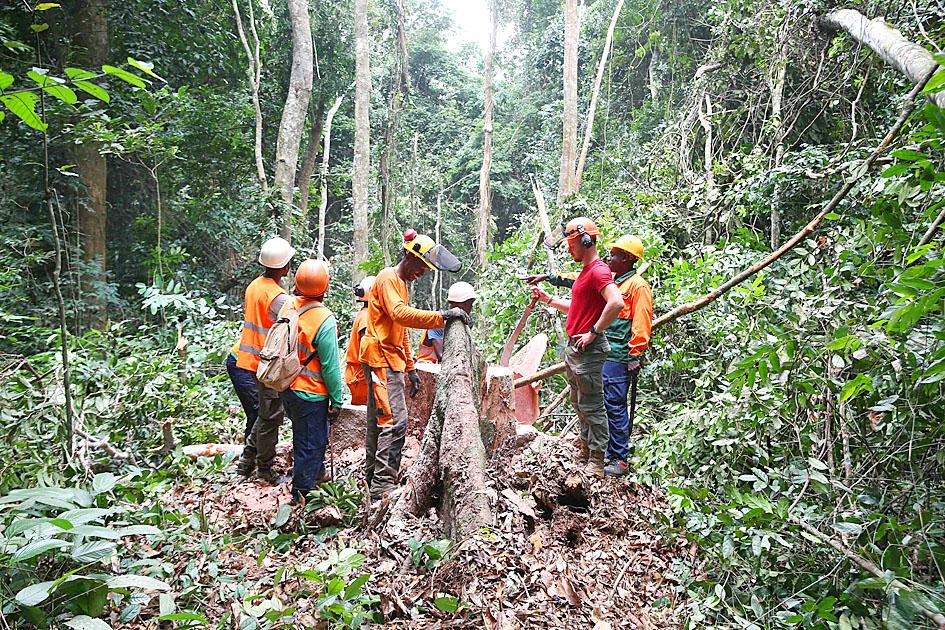Gabon, the second-most forested nation after Suriname, aims to create 187 million carbon credits, almost half of which could be sold on the offsets market in what would be the single largest issuance in history.
The government is working with the UN Framework Convention on Climate Change’s REDD+ mechanism to create the credits, Gabonese Minister of Water, Forests, the Sea and Environment Lee White said last week on the sidelines of a Commonwealth group of nations meeting in Rwanda.
Gabon also wants to harvest its forests sustainably to generate income, he added.

Photo: AFP
The carbon credits “will probably come on to market just before COP27,” White said, referring to the UN climate change conference scheduled for November in Egypt.
Ninety million credits will be sold, and “non-market” mechanisms will be used for the balance, he said.
Gabon, which is 88 percent covered by tropical rainforest, is trying to preserve its carbon-absorbing wilderness while diversifying its economy away from oil, demand for which is expected to plunge in coming decades.
The country was the first in Africa to receive funds to protect the ability of its forests to absorb carbon for reducing deforestation, last year receiving its first US$17 million payment from the Central African Forest Initiative, which is backed by a number of mostly European governments. The program, launched in 2019, plans to disburse a total of US$150 million over a decade.
The number of carbon credits Gabon aims to sell on the market could be worth about US$291 million based on the average price for similar projects calculated by Allied Offsets, a carbon offsets data provider. Such a large issuance, if done all at once, could flood the US$1 billion market.
Gabon’s forests form part of the Congo Basin, the world’s second-largest tropical forest after the Amazon.
Preserving forests is “almost a moral responsibility” and a matter of national security, White said.
The Congo Basin forest sends rainfall to the northern Sahel region, Ethiopia and beyond, and a plunge in precipitation elsewhere could destabilize parts of Africa, he said.
Carbon credits are tokens representing 1 tonne of climate-warming carbon dioxide that is reduced, removed or not added to the atmosphere, and companies use them to offset their own emissions. Credits can be traded on the international market for carbon production rights, or firms can invest in projects to produce credits themselves.
The poor quality of many available offsets has attracted skepticism from scientists, businesses and climate advocates.
“Many of these initiatives vastly overestimate their impacts,” Carbon Markets Watch policy officer Gilles Dufrasne said, referring to REDD+.
“Their benefits can be short-lived given the risk of future deforestation,” he said, adding that such a large issuance of these credits could harm the credibility of the market.
Papua New Guinea in March suspended carbon credit programs after concerns arose.
White dismissed that concern, saying Gabon has cut its emissions from deforestation and degradation by 90 million tonnes annually, compared with a baseline spanning from 2000 to 2009.
The number of forest elephants, a diminutive relative of the more common savanna elephant, rose by more than half to 95,000, and 13 national parks, six protected wetland sites and two world heritage sites were established, he said.

Vincent Wei led fellow Singaporean farmers around an empty Malaysian plot, laying out plans for a greenhouse and rows of leafy vegetables. What he pitched was not just space for crops, but a lifeline for growers struggling to make ends meet in a city-state with high prices and little vacant land. The future agriculture hub is part of a joint special economic zone launched last year by the two neighbors, expected to cost US$123 million and produce 10,000 tonnes of fresh produce annually. It is attracting Singaporean farmers with promises of cheaper land, labor and energy just over the border.

US actor Matthew McConaughey has filed recordings of his image and voice with US patent authorities to protect them from unauthorized usage by artificial intelligence (AI) platforms, a representative said earlier this week. Several video clips and audio recordings were registered by the commercial arm of the Just Keep Livin’ Foundation, a non-profit created by the Oscar-winning actor and his wife, Camila, according to the US Patent and Trademark Office database. Many artists are increasingly concerned about the uncontrolled use of their image via generative AI since the rollout of ChatGPT and other AI-powered tools. Several US states have adopted

KEEPING UP: The acquisition of a cleanroom in Taiwan would enable Micron to increase production in a market where demand continues to outpace supply, a Micron official said Micron Technology Inc has signed a letter of intent to buy a fabrication site in Taiwan from Powerchip Semiconductor Manufacturing Corp (力積電) for US$1.8 billion to expand its production of memory chips. Micron would take control of the P5 site in Miaoli County’s Tongluo Township (銅鑼) and plans to ramp up DRAM production in phases after the transaction closes in the second quarter, the company said in a statement on Saturday. The acquisition includes an existing 12 inch fab cleanroom of 27,871m2 and would further position Micron to address growing global demand for memory solutions, the company said. Micron expects the transaction to

A proposed billionaires’ tax in California has ignited a political uproar in Silicon Valley, with tech titans threatening to leave the state while California Governor Gavin Newsom of the Democratic Party maneuvers to defeat a levy that he fears would lead to an exodus of wealth. A technology mecca, California has more billionaires than any other US state — a few hundred, by some estimates. About half its personal income tax revenue, a financial backbone in the nearly US$350 billion budget, comes from the top 1 percent of earners. A large healthcare union is attempting to place a proposal before